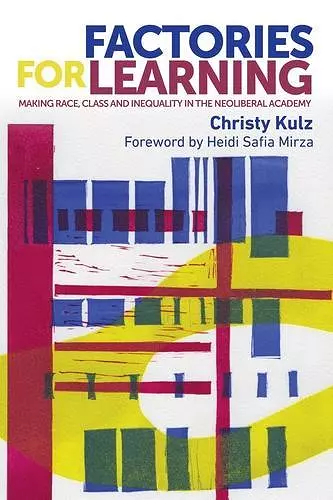Factories for Learning
Making Race, Class and Inequality in the Neoliberal Academy
Format:Paperback
Publisher:Manchester University Press
Published:3rd Aug '17
Should be back in stock very soon

Over half of England’s secondary schools are now academies. While their impact on achievement has been debated, the social and cultural outcomes prompted by this neoliberal educational model has received less scrutiny. This book draws on original research based at Dreamfields Academy, a celebrated flagship secondary school in a large English city, to show how the accelerated marketization and centralization of education is reproducing raced, classed and gendered inequalities. The book also examines the complex stories underlying Dreamfields’ glossy veneer of success and shows how students, teachers and parents navigate the everyday demands of Dreamfields’ results-driven conveyor belt. Hopes and dreams are effectively harnessed and mobilized to enact insidious forms of social control, as education develops new sites and discourses of surveillance.
This book is relevant to United Nations Sustainable Development Goal 4, Quality education
'Kulz's brilliant and chilling ethnography of Dreamfields Academy shows that students no longer merely learn to labour, as Paul Willis once put it, but rather education itself becomes a factory. Schools do not foster critical intelligence but rather make, shape and discipline young people in the doctrine and dream world of neoliberal capitalism. The book reveals the cruel hopes and authoritarian aspects of a modern urban academy schooling. It left me with a sense of outrage because these black, white and Asian working-class students, and every student for that matter, deserve so much more from education than this. This book outlines with sociological precision and keen attentiveness the shape of that educational betrayal.'
Professor Les Back, Goldsmiths, University of London
'This book is a ‘must read’ for all, particularly for teachers and parents. Christy Kulz’s ethnographic study unmasks how education practice within an urban academy school is raced, classed and gendered. This timely and exceptional book reveals how inequity is sedimented within the academies policy. It reveals a complex picture of how this academy is led and managed; how the relentless pursuit of better outcomes drives the ambitious aspirations of the headteacher and how the ethos of “structure liberates” reflects the zealous drive to educate and civilise ‘urban’ children to become units of economic productivity to attain social mobility. The headteacher’s evangelistic zeal is realised through disciplinary and regimented processes which subjugate teachers and pupils.
Christy Kulz shows how inequality is perpetuated in the school through the panoptic architecture of the school buildings, the stark surveillance of pupils and the enforcement of draconian rules which re-inscribe gender, race and class stereotypes within a regimen that serves to ‘normalise’ or whiten pupils’ identities. She shows how this results in symbolic violence on Black and minority ethnic bodies and how, for some pupils, the promise of social mobility remained an unrealised aspiration given the insurmountable structural inequalities they encountered every day.
This book will be a seminal text documenting the effects of the academies policy on schools, teachers and a generation of young people.'
Professor Vini Lander, Edge Hill University
'Christy Kulz has produced an incendiary and detailed account of the reality of life in an Academy school. Kulz’s ethnographic research, using a single school case study to explore wider issues of education reform, control and the creation of inequity, is in the best traditions of British sociology of education. The book is essential reading for anyone interested in the grim reality of education on the conveyor belt that lies behind the shiny deceitful rhetoric of aspirations and social mobility.'
Professor David Gillborn, University of Birmingham
‘Kulz writes well and engagingly, and the book offers an intelligent and sensitive reflexivity—the student researcher could learn a lot here about good writing, and the possibilities of a diverse and lively form of presentation “which seeks to blend theory with rich pictures of the social world”. Interviews, observations, pictures, and other data are set alongside one another to produce a vibrant sense of what Dreamfields is like and how it is experienced by the students and teachers…This book is the most exciting and engaging example of sociology of education that I have read for a long time. It works on a variety of levels. Its blend of traditional methods and contemporary problems, its historical sensibilities and theoretical sophistication, make it a very satisfying, provocative, and pertinent read.’
Stephen J Ball, University College London, Social Forces, Vol 97, Issue 1, September 2018
‘This is a book about an academy, but it is also a book about authority and discipline; about neoliberal education; about new incarnations of racism; and about how people make sense of living under an oppressive regime. The polemic of the title, describing academies as ‘factories for learning’, makes sense after reading it. Overall, this book serves as a powerful and convincing rebuttal to the ‘celebratory imperial histories' of Conservative education policy (2017, 15), all the while retaining a vivid sense of the humour and energy of the young people that it describes.’
Anna Bull, University of Portsmouth, The Sociological Review
'The book is provocative, emotionally affecting, and a noteworthy read to sociologically understand the education system in the UK. During my first reading as an undergraduate, and in re-reading as a doctoral student, it is inspirational to see how the blood, sweat and tears that go into a thesis can create an important and engaging work.'
Luke Zavrou-Blackstock, Educational Review (Feb 2022)
ISBN: 9781526116192
Dimensions: 234mm x 156mm x 11mm
Weight: 304g
208 pages